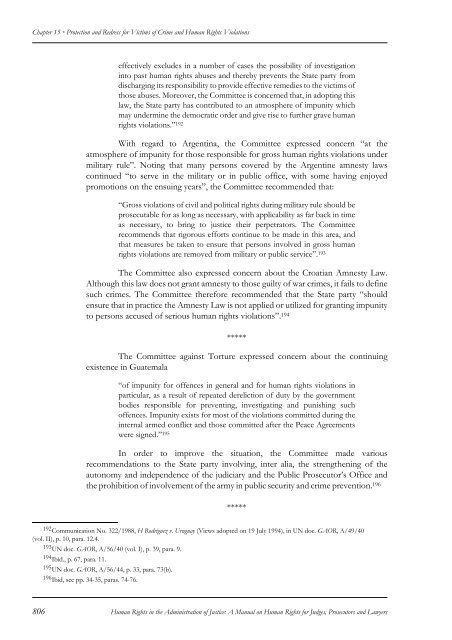protection and redress for victims of crime and human rights violations
protection and redress for victims of crime and human rights violations
protection and redress for victims of crime and human rights violations
You also want an ePaper? Increase the reach of your titles
YUMPU automatically turns print PDFs into web optimized ePapers that Google loves.
Chapter 15 • Protection <strong>and</strong> Redress <strong>for</strong> Victims <strong>of</strong> Crime <strong>and</strong> Human Rights Violationseffectively excludes in a number <strong>of</strong> cases the possibility <strong>of</strong> investigationinto past <strong>human</strong> <strong>rights</strong> abuses <strong>and</strong> thereby prevents the State party fromdischarging its responsibility to provide effective remedies to the <strong>victims</strong> <strong>of</strong>those abuses. Moreover, the Committee is concerned that, in adopting thislaw, the State party has contributed to an atmosphere <strong>of</strong> impunity whichmay undermine the democratic order <strong>and</strong> give rise to further grave <strong>human</strong><strong>rights</strong> <strong>violations</strong>.” 192With regard to Argentina, the Committee expressed concern “at theatmosphere <strong>of</strong> impunity <strong>for</strong> those responsible <strong>for</strong> gross <strong>human</strong> <strong>rights</strong> <strong>violations</strong> undermilitary rule”. Noting that many persons covered by the Argentine amnesty lawscontinued “to serve in the military or in public <strong>of</strong>fice, with some having enjoyedpromotions on the ensuing years”, the Committee recommended that:“Gross <strong>violations</strong> <strong>of</strong> civil <strong>and</strong> political <strong>rights</strong> during military rule should beprosecutable <strong>for</strong> as long as necessary, with applicability as far back in timeas necessary, to bring to justice their perpetrators. The Committeerecommends that rigorous ef<strong>for</strong>ts continue to be made in this area, <strong>and</strong>that measures be taken to ensure that persons involved in gross <strong>human</strong><strong>rights</strong> <strong>violations</strong> are removed from military or public service”. 193The Committee also expressed concern about the Croatian Amnesty Law.Although this law does not grant amnesty to those guilty <strong>of</strong> war <strong>crime</strong>s, it fails to definesuch <strong>crime</strong>s. The Committee there<strong>for</strong>e recommended that the State party “shouldensure that in practice the Amnesty Law is not applied or utilized <strong>for</strong> granting impunityto persons accused <strong>of</strong> serious <strong>human</strong> <strong>rights</strong> <strong>violations</strong>”. 194*****The Committee against Torture expressed concern about the continuingexistence in Guatemala“<strong>of</strong> impunity <strong>for</strong> <strong>of</strong>fences in general <strong>and</strong> <strong>for</strong> <strong>human</strong> <strong>rights</strong> <strong>violations</strong> inparticular, as a result <strong>of</strong> repeated dereliction <strong>of</strong> duty by the governmentbodies responsible <strong>for</strong> preventing, investigating <strong>and</strong> punishing such<strong>of</strong>fences. Impunity exists <strong>for</strong> most <strong>of</strong> the <strong>violations</strong> committed during theinternal armed conflict <strong>and</strong> those committed after the Peace Agreementswere signed.” 195In order to improve the situation, the Committee made variousrecommendations to the State party involving, inter alia, the strengthening <strong>of</strong> theautonomy <strong>and</strong> independence <strong>of</strong> the judiciary <strong>and</strong> the Public Prosecutor’s Office <strong>and</strong>the prohibition <strong>of</strong> involvement <strong>of</strong> the army in public security <strong>and</strong> <strong>crime</strong> prevention. 196*****192 Communication No. 322/1988, H Rodríguez v. Uruguay (Views adopted on 19 July 1994), in UN doc. GAOR, A/49/40(vol. II), p. 10, para. 12.4.193 UN doc. GAOR, A/56/40 (vol. I), p. 39, para. 9.194 Ibid., p. 67, para. 11.195 UN doc. GAOR, A/56/44, p. 33, para. 73(b).196 Ibid, see pp. 34-35, paras. 74-76.806 Human Rights in the Administration <strong>of</strong> Justice: A Manual on Human Rights <strong>for</strong> Judges, Prosecutors <strong>and</strong> Lawyers
















